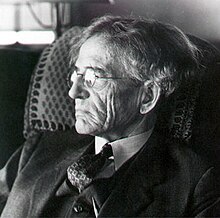John Rogers Commons
John Rogers Commons (born October 13, 1862 in Hollandsburg , Ohio , † May 11, 1945 in Fort Lauderdale , Florida ) was an American economist and sociologist. As such, he was also a leading proponent of institutional evolutionary economic theory, as well as an influential policy advisor.
Life
After successfully completing high school, Commons tried briefly as a teacher at an elementary school, but ended this attempt relatively quickly. In 1882 his family had saved enough money to enable him to attend Oberlin College. After his bachelor's degree there in 1888, he went to Johns Hopkins University in Baltimore ( Maryland ) for two years for further studies . There he received an offer for a position as a lecturer in economics from Wesleyan University in Connecticut in 1890 , but where his engagement was not extended. After another year at Hopkins University, in which he completed his doctorate , he got a job at Oberlin College . However, he left Oberlin after a year to take a higher-paying position at the University of Indiana . There he taught economics and sociology . He also left Indiana after a year for another better paid position at Syracuse University in Syracuse , New York . He was fired from this position in 1899 because the university administration believed that the activity of a 'radical' like Commons would negatively affect the university's fundraising.
Subsequently, Commons was active in the political field and in policy advice. For example, he compiled an index of wholesale prices, which was intended to provide arguments for the need for the government to expand the money supply, and then became a member of a government-appointed industry commission with the task of finalizing a report on immigration. He was then appointed to conduct research on taxation and industrial relations issues for the National Civics Federation . It was during this period that Commons developed an interest in industrial relations and trade unions , culminating in the publication of the History of Labor in the United States in 1918.
In 1904 Commons received an offer from the University of Wisconsin , where he was a professor until 1932. There he continued his work on the history of the labor movement and continued to develop, with the support of the politician and later Senator Robert M. La Follette sr. Legislation and policy making proposals and initiatives. In particular, he had a great influence on the design of the New Deal initiated by President Franklin Delano Roosevelt , which was supposed to overcome the effects of the global economic crisis, and he is sometimes even seen as the intellectual father of this political concept. Other political initiatives significantly influenced by the Commons include:
- Regulations relating to occupational safety
- unemployment insurance
- Social security-like retirement programs
- Compensation payments for accidents at work
In 1917, Commons presided over the American Economic Association as president-elect . Since 1936 he was an elected member of the American Philosophical Society .
Certainly influenced by his political activities, Commons turned to institutional political economy in the 1930s and in 1934 published the two-volume work "Institutional Economics. Its Place in the Political Economy".
Commons died on May 11, 1945 in Fort Lauderdale, Florida.
Fonts (selection)
- The Distribution of Wealth , 1893
- Social Reform and the Church , 1894
- Proportional Representation , 1896
- A Sociological View of Sovereignty , 1899, in: American Journal of Sociology
- Trade Unionism and Labor Problems , 1905
- Races and Immigrants in America , 1907
- Tariff Revision and Protection for American Labor , 1908
- Labor Administration , 1913
- History of Labor in the United States , 1918
- Industrial goodwill , 1919
- Legal Foundations of Capitalism , 1924
- Institutional Economics : Its place in political economy , 1934
- Myself , 1934
- The Economics and Collective Action , 1950.
Web links
- Literature by and about John Rogers Commons in the catalog of the German National Library
- More detailed biography (San José State University)
Individual evidence
- ^ Past and Present Officers. aeaweb.org ( American Economic Association ), accessed October 31, 2015 .
- ^ Member History: John R. Commons. American Philosophical Society, accessed June 25, 2018 .
| personal data | |
|---|---|
| SURNAME | Commons, John Rogers |
| BRIEF DESCRIPTION | American economist and sociologist |
| DATE OF BIRTH | October 13, 1862 |
| PLACE OF BIRTH | Hollandsburg , Ohio , USA |
| DATE OF DEATH | May 11, 1945 |
| Place of death | Fort Lauderdale , Florida , USA |
